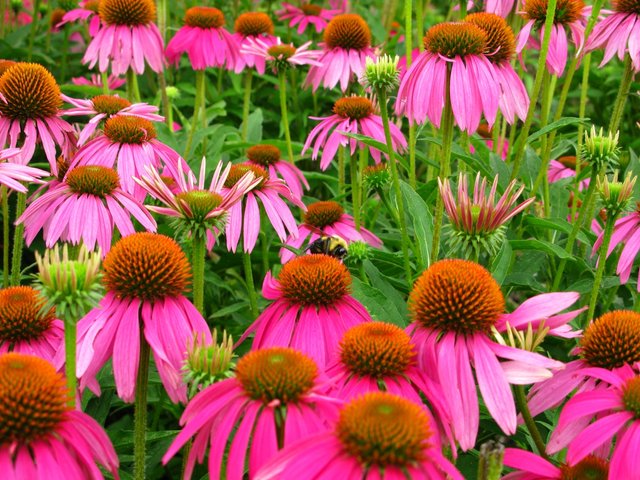How I Make My Own Medicinal Herbal Extracts
In a previous Steemit post, I summarized a research paper that exposed potential health benefits from consuming an extract of the herb, Echinacea Purpurea (a.k.a. Purple Coneflower). Here, I show a simple method of making your own herbal extract using the dried roots of Echinacea. Making herbal extracts is easy, fun, and much cheaper than buying ready-made extracts..

Echinacea Purpurea (a.k.a. Purple Coneflower)
Getting Started: Supplies
- Dried Herbs - For this I used the dried roots of Echinacea Purpurea. Arial parts of the herb may also be used, including the leaves and flowers. In Echinacea's case, as in the case of many other plants, the roots contain more of the beneficial compounds, and also lend themselves well to alcohol extraction.
- Clear glass jar - with a secure twist-on lid. A mason-type jar works well. It's best to work with small batches, so look for a small jar that holds about 200 - 300 ml jar.
- Vodka - 50% alcohol (100 Proof) is generally recommended and will be very efficient at extracting the herbs. 40% will also work quite well.
- Adhesive label - or masking tape, and a pen.
That is all you need to get started. I normally purchase dry herbs from Mountain Rose Herbs. They have an excellent selection of quality herbs at reasonable prices. I highly recommend them.

The jar I used here holds 250 ml of liquid. I prefer to make multiple smaller batches vice a single large batch. That way I can dip into one batch and still have another batch extracting for a longer period.

STEP 1: Create the label.
You can put as many details on the label as you like. I suggest the following at a minimum:
- Herb name
- Date created
- Alcohol content
Here I used an adhesive label. Some tape would work just as well. Affix the label to the jar after recording the details.

STEP 2: Add herbs to jar.
For a dried root extraction, fill the jar only to 20% to 30% with plant material. The roots will expand quite a bit after absorbing the alcohol.

STEP 3: Fill jar with vodka.
Fill the jar completely to the top, with just enough space to secure the lid afterwards.

STEP 4: Tighten Lid.
Replace the lid and hand tighten.

STEP 5: Place jar in cool, dark place.
Place jar in a cool dark place such as a drawer or cupboard. Shake the jar vigorously at least every couple of days. Ideally, the extraction should be allowed to continue for 4 to 6 weeks. If you can't wait that long, keep for at least 7 days. You can make multiple batches to allow for different extraction periods.

Echinacea Purpurea root extraction at 7 days
STEP 6: Strain liquid.
Over a large enough bowl, pour the liquid and root material through a fine mesh fabric such as cheese cloth. Squeeze with your hands to extract more liquid. The goal is to extract as much liquid as possible while filtering out all the particulate matter. A clean white t-shirt could also be used here. You may wish to strain the liquid a second time thorough an even finer mesh, such as a coffee filter. Discard the root material.

Remains of root material after straining liquid
STEP 7: Pour liquid into bottle.
Using a small funnel, pour the extracted liquid in to an amber dropper bottle. These can be purchased in many natural health or medical supply stores. They come in several sizes. I prefer the 2 oz and 4 oz bottles. Label the bottle with herb name, date of bottling, and alcohol content, also making note of the duration of the extraction. If kept at room temperature and out of bright light, the extraction will keep for several years.

4 oz amber dropper bottle
Mission Complete: Use as directed.
Now that you have created your own herbal extract, it is up to you to decide when and how to use it. Echinacea is a safe, yet powerful herb that can be used both internally and externally. It has been used for centuries by Native Americans. The following is a quote from Mountain Rose Herbs:
"Echinacea is one of the most widely known herbal medicines in American folk herbalism. Used extensively by traditional herbalists and Native Americans alike in North America for generations, echinacea eventually gained popularity in Europe in the 1900's. One of its main uses is to support healthy immune function, although many of its historical uses were related to topical applications. It is now one of the most available dietary supplements in health food stores and continues to be a subject of many scientific studies investigating its immune support properties."
One very practical use I have found for echinacea is for relief from mosquito bites. In my experience, a couple drops on a fresh bite completely eliminates the itching and reduces the swelling. If that was the only use for this herb, that would be valuable enough. For more detailed information and a historical perspective on echinacea, I recommend the book, "The Healing Power of Echinacea and Goldenseal", by Paul Bergner.